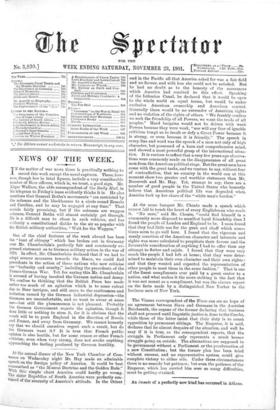At the annual dinner of the New York Chamber of
Com- merce on Wednesday night Mr. Hay made an admirable speech on the foreign policy of America. It could be best summarised as "the Monroe Doctrine and the Golden Rule." With this simple.- chart America could hardly go wrong. The sistet Republica a South America were perfectly con- vinced of the necessity of America's attitude. In the Orient and in the Pacific all that America asked for was a fair field and no favour, and with less she could not be satisfied. But he had no doubt as to the honesty of the assurances which America had received to this effect. Speaking of the Isthmian Canal, he declared that it would be open to the whole world on equal terms, but would be under exclusive American ownership and American control. Generally there would be no surrender of American rights and no violation of the rights of others. "We frankly confess we seek the friendship of all Powers, we want the trade of all peoples." Hard bargains would not be driven with weak Powers because they were weak, "nor will any fear of ignoble criticism tempt us to insult or defy a Great Power because it is strong, or even because it is friendly." The speech in every line and word was the speech of a man not only of high character, but possessed of a keen and comprehensive mind, and showed a most powerful grasp of the international situa- tion. It is curious to reflect that a very few years ago observa- tions were commonly made on the disappearance of all great men from the American political stage. But the great men have come with the great tasks, and we venture to say, without fear of contradiction, that no country in the world can at this moment show two greater and worthier statesmen than Mr, Roosevelt and Mr. Hay. Yet, strange to say, there are a number of good people in the United States who honestly believe that American political life was degraded when America took up her share of the "white man's burden."










































